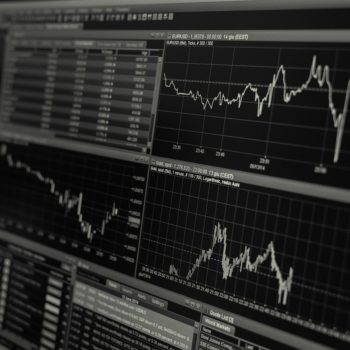Why We Love It
-
Great Salary
-
Upward Mobility
-
Wide Variety of Career Paths
* The Why We Love It section is solely based on the opinion of OnlineDegree.com's Editorial Team. Any salary & growth research or estimates should be referenced further at the Bureau of Labor and Statistics data published at https://www.bls.gov/ for your specific desired career.
What is a Master of Economics?
Some people consider economics an esoteric concept–or even a scary word in itself. Others realize it’s simply the social science that explores the interaction between people and value, e.g., the production, distribution, and consumption of goods and services.
Business, government, healthcare, finance, real estate–these are all areas in which economic theory can be applied. Those who understand this can make economics work for them.
A Master of Economics, sometimes abbreviated MEcon or MEc, is a postgraduate degree for both professionals and those who wish to enter a doctoral program in economics. This highly sought-after degree could be your first step toward working for a small business, a large corporation, or even the government.
A master’s education in economics provides students with advanced critical thinking skills and quantitative skills that are considered valuable assets across many industries. The expertise is in high demand hence it makes this degree an excellent way to have a secure career with plenty of growth opportunities.
While master’s programs in economics vary, all will cover the following important concepts upon which modern economics is founded:
- Microeconomics: This focuses on the decisions of individuals and companies, scarcity of resources, and the relative prices of goods and services.
- Macroeconomics: This studies the sum total of economic activity: things like inflation, unemployment, and growth, as well as the policies that influence these factors.
- Econometrics: At its core, this simply refers to using scientific methods to determine simple relationships by analyzing economic data.
Recommended Schools
What Can You Do With a Master of Economics?
A market research analyst helps a company identify an opportunity to increase its profits by optimizing pricing on a new product. A policy analyst helps to influence government decisions that lead to more desirable economic conditions for their community.
An economist develops an exciting new theory that helps experts to better understand the effects of e-commerce on retail shopping habits. These are all potential futures for someone with a master’s in economics.[Ma1]
These are only a few examples. And the possibilities are endless. You get to choose what you’ll do, and you don’t have to know what that is right now. A master’s degree in economics could give you the tools you need to do a wide variety of jobs, so you’re not committing to a career before you even finish your degree.
Undergoing a MEcon education, students acquire specialization in fields such as data as well as financial analysis, consulting, and public policy, opening up paths for diverse career opportunities.
Best Programs for Master of Economics
Here’s the best part: We’re going to give you the secrets to finding the best programs for adults, programs that could help you get your Master of Economics degree faster and with as few headaches as possible.
We know planning for college can be confusing, and OnlineDegree.com is dedicated to helping you find the right path for you so that you can complete your degree and start your new career as soon as possible.
Why We Love a Master of Economics
- Great salary: A Master of Economics is a respected degree that could help you to make more money. Opportunities with a higher salary mean a greater likelihood of financial stability as well as employment stability. This could be a great advantage in situations of economic uncertainty.
- Upward mobility: A master’s degree in economics could help you to climb the corporate ladder faster. With an advanced, professionals have a higher chance of finding higher-level positions, that come with more responsibilities and growth but also higher and better pay.
- Wide variety of career paths: A Master of Economics is traditionally one of the most marketable degrees, and it could equip you to work in several different industries.
Online vs. Traditional Campus Master of Economics Programs
Most people who think about going back to school and getting their master’s in economics never even get started. Not only are there various entrance hurdles like exams and application fees, but it’s also tough to make school work around your schedule.
And for someone who has a lot of other commitments like work, family, or personal, this decision may be pretty challenging. Right?
Guess again.
With adult-friendly schools, there is really no reason not to go back to school anymore.
So, what is it that makes a school adult-friendly?
Here are a few key attributes:
- Adult-friendly schools are totally online. Online learning is best for busy adults, who have to balance their ongoing education with work, kids, and everything else that comes with being a grownup. With the world shifting online, online education has also paved its path. Online schools offering an MBA allow you to work college around your life, not the other way around.
- Adult-friendly schools can offer accelerated programs, with ongoing enrollment. What’s better than getting your MBA in two years? Getting it in fourteen months. With ongoing enrollment, you don’t have to wait until fall or spring to start on your new journey; many schools offer monthly enrollment periods, meaning you can start whenever it works for you.
- Adult-friendly schools can offer more support than traditional schools. This includes but is not limited to, career services, making it easier for you to begin your new career. Because, at the end of the day, isn’t that why you’re going back to school? With an adult-friendly school, you will benefit from career-related guidance and resources such as resume preparation and job search to help in securing future prospects.
Recommended Schools
Admissions Requirements for Master of Economics
So what do you need to go to grad school? First of all, you need to take the GRE or another entrance exam, right?
No!
You might be surprised to learn that many adult-friendly schools do not require GRE or entrance exams. Online Master of Economics programs generally require only a bachelor’s degree to get started, and there are no application fees to worry about. You start when you’re ready.
Master of Economics Curriculum
Because economics is such a complex machine, a master’s program must cover a wide array of topics that are important to understanding the subject. While your curriculum may vary according to your school of choice, there are some core areas of knowledge that will be covered by most programs.
What Courses Will I Take in My Master of Economics Program?
As mentioned above, economics is incredibly complicated, and different schools may focus on different concepts, but some common examples of courses could include:
- Mathematical Economics: This uses principles of mathematics to create economic theories and predict future economic activity.
- Microeconomic Theory: As mentioned above, this focuses on the decisions of individuals and companies, analyzing how free markets establish relative prices and lead to desirable allocations.
- Macroeconomic Theory: This applies to regional, national, and global economies; relevant topics include GDP, energy, and international trade.
- Applied Econometrics: Analyzing economic history, forecasting, and developing new theories all require applying econometrics to real-world data.
- Labor Economics: This is the intersection of economics and sociology since labor is an important commodity but inextricable from the people who provide it.
- Behavioral Economics: Psychological, emotional, and social factors can all cause individuals’ decisions to diverge from those predicted by classical economic theory.
Specializations and Concentrations
Some schools could offer specializations that allow you to choose a more focused master’s degree in economics.
Examples may include:
- Financial Economics: This would likely involve more in-depth coverage of theoretical finance, as well as the framework upon which the theory is based. This could be geared toward doctoral work, research positions, or applied economics.
- International Economics: Thanks to advances in transportation and information technologies, the world is smaller than ever. This degree concentrates on economics as it applies to international trade.
- Development Economics: This branch of economics concentrates on improving conditions in developing nations, considering factors such as health, education, and economic policy.
- Sustainable Economic Development: It is more important than ever to consider the environment while meeting human development goals. By taking into account natural resources and ecosystem services, we can meet current needs while preserving the ability of future generations to meet their needs as well.
- Agricultural Economics: Economic theory can be applied to optimize the production and distribution of food, land usage, and other agricultural concerns.
- Applied Economics: This could combine economic theory with other concepts such as finance, machine learning, and data analytics.
Additionally, your school could offer a master’s in economics under a different name, such as:
- Master of Science (MS) in Economics
- Master of Arts (MA) in Economics
- Master of Economic Sciences (MEconSc)
- Master of Commerce (MCom) in Economics
- Master of Applied Economics
Master of Economics Program Length
Most Masters of Economics degrees require between 30 and 36 credits to graduate. Normally, a Master of Accountancy program takes one to two years to complete. An accelerated plan, however, could take less time. This is where adult-friendly schools really shine, understanding the difficulties the adult students face because of the resource constraints they face.
They know their students have jobs, kids, and other obligations that make a traditional school schedule unrealistic. The best adult-friendly schools make the process as convenient as possible, and they could get you into the workforce as fast as possible because they know that’s what adults want.
Choosing the Right University or College Master of Economics Program
Choosing the right school for you can be exciting, but it can also be a hassle. Tuition costs, application fees, accreditation, enrollment windows, and entrance exams are just some of the variables to consider.
That’s why we created the Smartplan. We want to help people go back to school, to make college more accessible and affordable for everyone.
With our Smartplan, we make it easy for you to start on your path towards your Master of Economics. Here are just some of the benefits of your OnlineDegree.com Smartplan:
- No application fees
- Accredited colleges and universities
- No entrance exams or testing
- Faculty and professors who understand adults
- Discounts and scholarships available
- Open enrollment dates
Recommended Schools
Best Jobs for Those With a Master of Economics
What can you do with a master’s in economics? What kind of salary can you expect?
Here are some common careers for Master of Economics holders, with salary data estimates provided by the Bureau of Labor Statistics:
- Economist: This is someone who applies economic theory to a variety of fields including education, public health, and development, often working for the government. You could make anywhere from $62,460 to $193,690 per year.
- Budget Analyst: Both private and public organizations need someone to help plan their finances. You could make anywhere from $49,330, to $124,440 per year.
- Market Research Analyst: This person examines the potential sales of a product or service by analyzing market conditions. You could make anywhere from $37,570 to $128,320 per year.
- Policy Analyst: This is someone who studies the economic side of government and forecasts economic trends. You could make anywhere from $60,960 to $164,210 per year.
- Statistician: This is someone who collects, analyzes, and interprets data, and develops statistical models. You could make anywhere from $49,350 to $157,300 per year.
We’ve compiled some of our favorite careers, but this degree does provide you with broad skills to work in a variety of positions, as master’s in economics holders are usually in high demand across many industries.
Best of all, you could work for a company to gain experience and then go into business for yourself, after all, it is the reign of start-ups and innovation! This could really be adventurous and hey, these are just some of the endless possibilities you can choose from.
Cost and Tuition
Cost and tuition vary from school to school, and you’ll want to speak with each of your prospective schools directly. Fortunately, online schools are generally more affordable than their in-person counterparts.
Adult-friendly colleges understand that you want to save, and they could even help you with financial aid if you’re eligible. The importance of financial help cannot be underestimated during times of economic uncertainty, rising inflation, and risks of unemployment.
You’ll definitely want to speak to a few schools, and OnlineDegree.com can help you with that.
Frequently Asked Questions (FAQ)
Q: Do I need to know what job I want before I start a master’s program in economics?
A: No! A Master of economics could prepare you for a wide variety of careers. You certainly don’t need to know what job you want today.
Q: Will I make more money with a master’s in economics?
A: That depends on a variety of factors. But as you can see above in the “Best Jobs for Those With a Master of Economics” section, your master’s could mean excellent earning potential.
Q: How long will I be in school?
A: That could depend on you, your current job, and any other obligations you might have. A Master of Economics program could take anywhere from one to four years, but our Smartplan is designed to help you find the right degree for you, so you could finish as quickly as possible!
How to save time and money
Our mission is to help you to avoid paying full price for college. We want your Master’s in Economics degree to be affordable and accessible. Here’s how you could save:
Create Your Free SmartPlan

There are many ways to make college affordable and accessible.
That’s why we created a helpful tool called SmartPlan.
It’s free, and helps you find potential ways to save and tons of information about each school you’re considering
Think of it as your “college blueprint”, to help you instantly craft a path to your degree:
- Which Colleges Match Your Needs
- Ways You Could Save Time & Money
- Free Courses You Could Take for Credit
- Valuable Data and Insights on Each College
- Detailed Steps You Should Take!
See what’s possible for you and generate a free plan within just a few minutes
Create My SmartPlanYou Might also be Interested in
Many visitors who look for a degree in Master’s in Economics are also interested in the following degrees.





